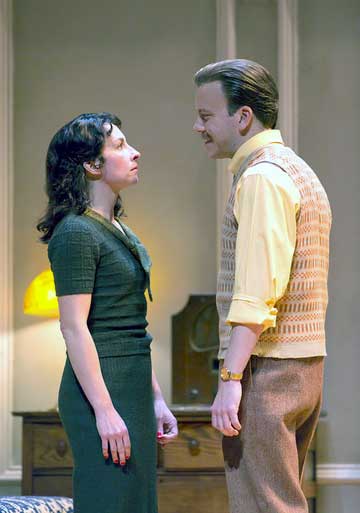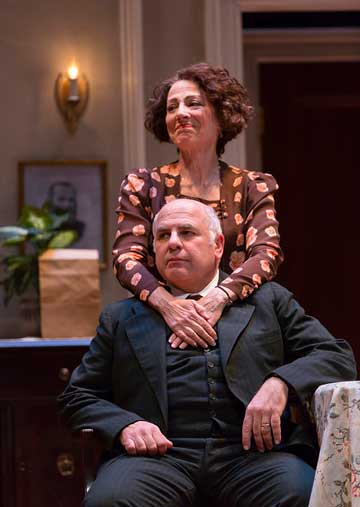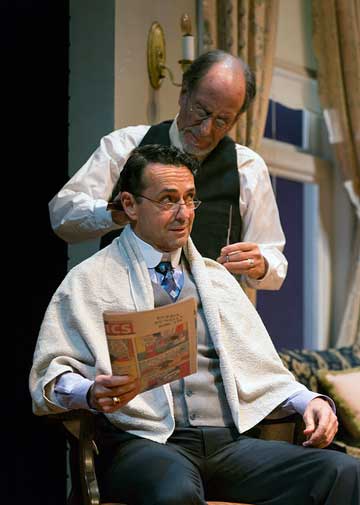Play (1935)
by Clifford Odets
Directed by Melia Bensussen
Huntington Theatre Company
Boston University Theater, Boston, MA
November 7 – December 7, 2014
With Michael Goldsmith (Ralph Berger), David Wohl (Myron Berger), Annie Purcell (Hennie Berger), Will LeBow (Jacob), Lori Wilner (Bessie Berger), Kevin Fennessy (Schlosser), Eric T. Miller (Moe Axelrod), Stephen Schnetzer (Uncle Morty), Nael Nacert (Sam Finschreiber)

Eric T. Miller as Moe Axelrod
in “Awake and Sing”
Photo: T. Charles Erickson
Courtesy of the Huntington Theatre Company
It’s the Depression in New York and the Berger family is having some issues.
The daughter, Hennie (Annie Purcell), is unmarried but seemingly in love with the war-wounded and existentially fraught Moe Axelrod (Eric T. Miller). Bessie Berger (Lori Wilner), a matron capable of undercover operations with the best of them, engineers a betrothal for her to Sam Feinschreiber (Nael Nacer), a decent, responsible, but unexciting, match. The younger son, Ralph (Michael Goldsmith), is full of his own piss and vinegar, while grandfather Jacob (Will LeBow) injects socialist ideals amidst the familial melee. Destinies are sculpted by manipulative twistings while flights from desperation hover, non-scheduled, in the wings.
The craft in the plot-working of this early effort by Odets is strikingly good. The revelation of deeply worn disappointments and the shock of acutely insensitive actions produce a strong brew. Odets paints, within the accumulated intensity of interpersonal grievance, a few rays of hope that continually draw the players until the strain of resistance to them becomes too much to bear.
Though the general pacing of the drama has the outlines of Chekhov about it – a social comedy that eventually shows its tragic face – there is also something with the accumulating drive we associate with O’Neill’s great works. Those come along decades later, but, this first work of Odets reveals, particularly in the desperate hampered longing of Axelrod, a taste, in a Jewish-American idiom, of what O’Neill realizes in his great Irish-Americans of the later tragedies.

David Wohl as Myron
in “Awake and Sing”
Photo: T. Charles Erickson
Courtesy of the Huntington Theatre Company
The current production is extremely effective at creating both the tenor of the times – the early Depression – and the mix of potent psychologies that emanates from it.
Lori Wilner, as Bessie, is masterfully devious, arriving at the destination of her intensely conceived conjurings through an innocent ascent, making them all the more potent.
Annie Purcell, as Hennie, is appropriately fraught, caught in the web of Bessie’s dealings, her passions and hopes twisted and reprocessed in the mill of Depression desperation.
Eric T. Miller is the wounded Axelrod, quite intensely longing for his mark, psychologically convincing, but not quite as culturally persuasive.
The highly versatile Nael Nacer gives a very good account of the hapless Sam Feinschreiber (a great name for a poor schlub), conveying an idiomatically authentic decency while daunted and thrown by Hennie’s distractions.

Stephen Schnetzer as Uncle Morty
in “Awake and Sing”
Photo: T. Charles Erickson
Courtesy of the Huntington Theatre Company
Will LeBow (Jacob) delivers the Marxist spiel with gusto, inserting into the strains of political idealism an intermittent fanfare directed to some elusive form of hope which, in its own immediate variations, echoes in the lives of his grandchildren.
The ingenious scenic design by James Noone both conveys a sense of the tenement and beyond – with a soaring rise of walls on three sides – while effectively utilizing mobile inserts to generate the sense of familial intimacy.
The Huntington, under Melia Bensussen’s capable direction, has created an authentic and compelling account of this early, but strikingly good, work by one of the great Jewish-American playwrights of the twentieth-century.
– BADMan
Leave a Reply